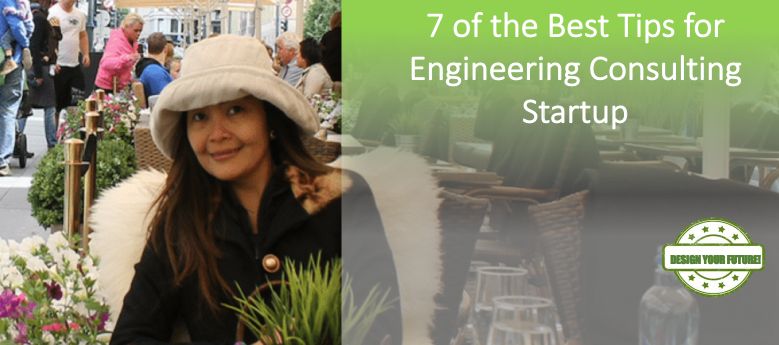7 of the Best Tips for Engineering Consulting Startup
Engineering Consulting Business Startup seems daunting…
People often ask for the best list of steps they can use on how to start their own engineering consulting firm from the ground up.
So if you are searching for the best consulting business startup guidelines, this article is part of our “Business Startup Guide”— a collection of our articles that will help you get started even without a complex business plan.
Several Points to Remember in Consulting:
- Every business is unique and you may need to refine this list as you go
- Must have great passion in what you do
- Big business starts small & started with one or three high-value clients
- Work towards your life and work principles
- Be logical to offer only what makes sense to your clients
Here are the 7 of the Best Tips to Setup your Own Engineering Consulting Firm
Step1: Idea Screening
Countless people dream of becoming business owners, they have a lot of business ideas running in their heads, but why most businesses fail?
Idea screening is first on your list because you truly do not know what your ideal customer needs from you.
So, you can first list down all the ideas you have that matches your own engineering skills or expertise.
Are you in aerospace engineering?
Bio-medical engineering?
Civil engineering or chemical engineering?
Or maybe a mechanical or environmental engineer?
What do you think you can do for your ideal customers?
Once you have already listed your consulting business ideas, evaluate your idea, who will buy or use your service?
Step2: Test & Validate Your Idea
How engineers can test and validate their consulting idea?
First look through the list of contacts that you have acquired since you started working as an engineer; both in the course of business and in your work with engineering companies.
Those who you have worked or impressed upon you are often willing to introduce you to some potential clients in your field.
It’s never too early to start making connections with engineering industry influencers and engineering societies.
Ways To Start Making Connections
- Networking with engineering societies which you belong
- Join forums
- Become an active member of your local chapter of the American Institute of Architects (AIA)
- Connect with Linked-in
- Land Surveyors
- Construction lead service companies
- Referrals from other consulting engineers of a different field
Begin writing down the names and their contact information and write down how your engineering expertise can match in solving a specific problem of your ideal future customers.
Step3: Discovery Call
Go and talk to them to discover how you can help them.
Talk that only make sense to your target market.
Be obsessed with your customer problem and do the hard work to understand your customers and the problems that they want to get solved.
Listening may lead to sealing deals as well as improvements in setting up engineering consulting services.
If that problem matches your service idea, then describe one preferred service and the problem it solves.
The path to sealing deals lies through your ears because you can get feedback that you can act on step4.
Step4: Strategy Session
Normally, customers don’t know what they want.
“A lot of times, people don’t know what they want until you show it to them.” – Steve Jobs
The problem is that too often, customers cannot even recognize that they are facing a problem.
Your role as a consultant is to explain to your potential client the problem that they are currently facing and the consequences if they do nothing to solve their problem.
Businesses or individuals hire a consultant because of several reasons:
- They want specialized skills
- They want an outside eye to identify problems
- To bring change to the organization & their businesses
- Providing a solution to their pain points
- To get to their desired position faster
Step5: Get Your Proposal Right
The engineering consulting startup’s biggest challenges are getting its quotes right.
Many prospective clients request proposals before officially signing an agreement.
The better you understand your prospective client’s challenges and pain points, the more impactful your proposal can be.
The best thing to do is ask what others in the industry have done.
Understand what others are charging, so you don’t go too far above or below the normal engineering consulting price standard.
Be as specific as possible about the value and outcomes your client can expect from your consulting service.
Specify your project scope, timeline, fees, your payment terms, and most importantly, include your call to action – what your client needs to do next.
Give clear instructions in the final section of your proposal so clients know how to move forward.
Step6: Deliver What They Expect From You
Engineering takes in all sorts of disciplines so you need to communicate constantly with your clients.
You must develop your relationships with new clients while ensuring that any concerns are answered.
You need to keep expectations and solution delivery aligned.
Clients have different preferences on how to deliver your services.
Some will want regular updates on the project progress, some will want to meet face to face once a month, some prefers live call via Zoom or Skype.
Step7: Prepare For Trial & Error
Whether you’re starting your first or your second engineering consulting company, expect to make mistakes. There is no smooth business startup. You may not get right the first time testing your first business version.
This is natural and so long as you learn from them, also beneficial.
Mistakes are your best teachers for growing.
The great thing about setting your own business is that you get to set your own business rules – decide what you want to do and where you’ll grow.
Most people started off with a service that they wanted to provide – this is really a BIG mistake you want to avoid.
Conclusion
An incredibly common problem that causes engineering consulting firm to fail is that there’s no market fit for the product or services that they have built.
They fail to develop a minimum viable offer to test & validate that meets the market need.
An MVO (minimum viable offer) can help any engineering consulting business startup to gather feedback from potential customers quickly – an offer that provides the smallest number of benefits necessary to close a deal!




